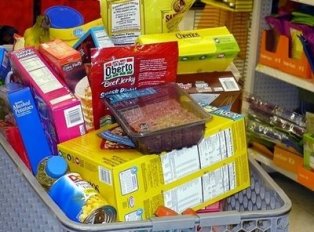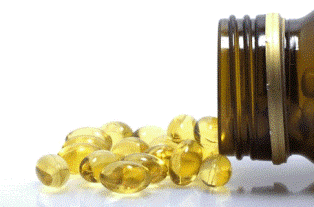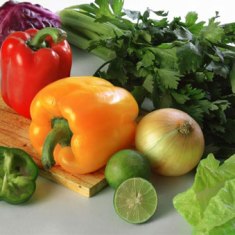August 29th, 2010 by Toni Brayer, M.D. in Better Health Network, Health Tips, True Stories
No Comments »

 I know it’s not politically correct to look at what other people buy at the grocery store, but as a physician I just can’t help noticing. Some carts contain huge containers of soda pop, Doritos, frozen pizza, and other packaged goods.
I know it’s not politically correct to look at what other people buy at the grocery store, but as a physician I just can’t help noticing. Some carts contain huge containers of soda pop, Doritos, frozen pizza, and other packaged goods.
I’m not surprised, because at the end of every isle is a display case that offers the giant soda for 89 cents or the Doritos on special for $1.29. With this type of marketing, it takes a strong person to resist the “bargain.”
Yesterday the woman in front of me (overweight, middle-aged) had a strange assortment of goods that she probably thought would help her lose weight. She had several Weight Watcher-type meals, diet drinks, power bars, and lots of “light” items — “light butter,” “light crackers,” “light yogurt,” and “light ice cream.”
Folks, this won’t work. Eating this way won’t help her lose weight. She needs to make dramatic changes to drop the pounds. Read more »
*This blog post was originally published at EverythingHealth*
August 28th, 2010 by KerriSparling in Better Health Network, Health Tips, Humor, Opinion, True Stories
No Comments »

 I keep measuring cups in my purse so that I can measure out my dinners out to be exact. I keep a small food scale in the glove compartment of my car so I am never guessing how many ounces a certain item might be. And I have the Calorie King booklet in my pocket at all times, so that I’m never left guessing. I even sewed pockets into all my clothes, just to bring the booklet around.
I keep measuring cups in my purse so that I can measure out my dinners out to be exact. I keep a small food scale in the glove compartment of my car so I am never guessing how many ounces a certain item might be. And I have the Calorie King booklet in my pocket at all times, so that I’m never left guessing. I even sewed pockets into all my clothes, just to bring the booklet around.
(The previous paragraph is filled with lies. Big, fat ones.)
I wish I was a precision carb counter. I wish I had the patience for it, always either eating pre-packaged and factory-analyzed foods or spending my time carefully measuring and weighing any home cooked adventures. But I am not a precision carb counter. I’m a precision carb guesser. Read more »
*This blog post was originally published at Six Until Me.*
August 21st, 2010 by JenniferKearneyStrouse in Better Health Network, Health Tips, News, Research
No Comments »

 A new study in the American Journal of Obstetrics & Gynecology reports that low levels of vitamin D may be linked to early-onset preeclampsia in pregnant women.
A new study in the American Journal of Obstetrics & Gynecology reports that low levels of vitamin D may be linked to early-onset preeclampsia in pregnant women.
The trial found that the average vitamin D level in 50 pregnant women with preeclampsia was 18 ng/mL, compared with 32 ng/mL in 100 women with healthy pregnancies. No casual relationship was proven, and the study’s lead author told Reuters Health that the recommended vitamin D intake in pregnant women hasn’t changed, but the study results raise yet more questions about this much-discussed nutrient.
ACP Internist covered the pros and cons of vitamin D in its November 2009 issue. (Reuters, ACP Internist)
*This blog post was originally published at ACP Internist*
August 20th, 2010 by Medgadget in Better Health Network, Health Tips, News
No Comments »

 Medtronic MiniMed has recently released a new educational game for kids and young adults that takes them through an educational tour to learn how to deal with foods when you have diabetes.
Medtronic MiniMed has recently released a new educational game for kids and young adults that takes them through an educational tour to learn how to deal with foods when you have diabetes.
A rep for the company tells Medgadget:
Called Carb Counting with Lenny, it’s offered for free download on the Apple iTunes App Store for the iPhone, iTouch and iPad. It’s great for parents (and even adults with diabetes have enjoyed it too), as the app features a guide presenting nutritious food choices with associated serving sizes and carbohydrate values. The other key components of the app are fun, interactive games that help reinforce carb counting skills and keep children engaged. And just in case you are not fully familiar with Lenny the Lion, he is a global ambassador for children’s diabetes education.
What’s more, there’s a contest with prizes for those who can beat Lenny at the app’s carb counting games.

Link: Carb Counting with Lenny!
Contest Rules….
*This blog post was originally published at Medgadget*
July 31st, 2010 by Toni Brayer, M.D. in Better Health Network, Health Tips, Research
No Comments »

 The Environmental Working Group (EWG) is a non-profit focused on public health. We know that the long-term consequences of eating chemicals from pesticides used on our foods is damaging to our health.
The Environmental Working Group (EWG) is a non-profit focused on public health. We know that the long-term consequences of eating chemicals from pesticides used on our foods is damaging to our health.
The EWG analyzed data from the FDA and found that people who eat five fruits and vegetables a day from the “Dirty Dozen” are eating 10 pesticides a day. We want people to eat more fruits and vegetables, but NOT to ingest more chemicals. Rinsing reduces but does not eliminate pesticides. So what’s the answer? Rinse completely and buy the “Dirty Dozen” foods organic whenever possible. Read more »
*This blog post was originally published at EverythingHealth*
 I know it’s not politically correct to look at what other people buy at the grocery store, but as a physician I just can’t help noticing. Some carts contain huge containers of soda pop, Doritos, frozen pizza, and other packaged goods.
I know it’s not politically correct to look at what other people buy at the grocery store, but as a physician I just can’t help noticing. Some carts contain huge containers of soda pop, Doritos, frozen pizza, and other packaged goods.



 I keep measuring cups in my purse so that I can measure out my dinners out to be exact. I keep a small food scale in the glove compartment of my car so I am never guessing how many ounces a certain item might be. And I have the Calorie King booklet in my pocket at all times, so that I’m never left guessing. I even sewed pockets into all my clothes, just to bring the booklet around.
I keep measuring cups in my purse so that I can measure out my dinners out to be exact. I keep a small food scale in the glove compartment of my car so I am never guessing how many ounces a certain item might be. And I have the Calorie King booklet in my pocket at all times, so that I’m never left guessing. I even sewed pockets into all my clothes, just to bring the booklet around.
 A new study in the American Journal of Obstetrics & Gynecology reports that low levels of vitamin D may be linked to early-onset preeclampsia in pregnant women.
A new study in the American Journal of Obstetrics & Gynecology reports that low levels of vitamin D may be linked to early-onset preeclampsia in pregnant women.
 Medtronic MiniMed has recently released a new educational game for kids and young adults that takes them through an educational tour to learn how to deal with foods when you have diabetes.
Medtronic MiniMed has recently released a new educational game for kids and young adults that takes them through an educational tour to learn how to deal with foods when you have diabetes.
 The
The 







